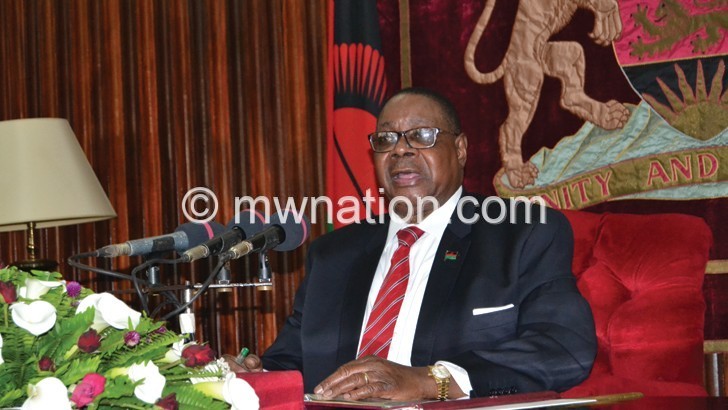Fury over APM Injunctions talk
President Peter Mutharika has stepped on legal scholars’ raw nerves over his suggestion that some court orders issued by the country’s courts are “unreasonable and irresponsible” to the progress of the nation.
Reacting to The Nation’s question on their take on the President’s sentiments expressed in Blantyre on Tuesday, the Malawi Law Society (MLS) and three legal scholars—professor Danwood Chirwa, Mwiza Nkhata and Sunduzwayo Madise—said Mutharika’s remarks were unfortunate and a threat to the morality and independence of judicial officers.
During the swearing-in ceremony of two newly appointed High Court of Malawi judges—Jack N’riva and Thomson Ligowe, the President expressed concern over the growing list of court orders which he said were frustrating government’s efforts to execute its legitimate responsibility.

In his reaction, MLS honorary secretary Michael Goba Chipeta observed that such public sentiments have the potential to unduly water down the integrity of judicial officers.
He said: “The President’s remarks, especially coming from that high office of his, are extremely unfortunate. There are legal principles and guidelines that dictate when an injunction order should be given or not and in what manner.”
Chipeta said for a judge or court to grant an injunction order, it is only because the said principles and guidelines of law sanction the same for purposes of dispensation of justice according to law and not for any other reason.
He said: “Now for the President to express worry when the courts grant injunctions under well mapped principles of law, to say the least, undermines the integrity and independence of judicial officers.”
On their part, in separate interviews, Nkhata and Madise, who both teach law at Chancellor College, a constituent college of the University of Malawi (Unima), said courts apply well settled principles in deciding whether to grant an injunction or not.
Nkhata said for him, the gripe by Mutharika raised several pertinent questions on the court orders.
He said: “Is the President suggesting that courts are erroneously granting injunctions? If the President believes that injunctions are being granted erroneously, how vigilantly has the government been moving to vacate such injunctions? Thirdly, if indeed there are too many injunctions against the government, why is this so?”
But Madise said while he did not listen to Mutharika’s comments verbatim, he thought on the general question of injunctions, it was “extremely wrong to give an impression that courts just issue injunctions willy-nilly”.
He said: “Courts do not decide on cases on their own. They are asked by litigants. And even where they are moved, courts do not just issue injunctions. They must be satisfied that the circumstances warrant the granting of an injunction.”
Madise noted that on a good number of cases, courts have also refused to grant injunctions because they would want to hear from the other side before an injunction may be granted.
He said instead of complaining, maybe people should find out why these injunctions are granted in the first place.
However, the legal scholar agreed with Mutharika that injunctions could indeed affect government’s programmes although this would only happen if something goes amiss.
Said Madise: “Where all correct administrative procedures and protocols have been duly followed, it is unlikely an injunction would be granted.”
While describing the issue as complicated, Chirwa, a professor of law at the University of Cape Town in South Africa, said to work well, the injunctions law should strike the right balance between protecting people’s rights and allowing government to perform its constitutional responsibilities.
He said: “At the moment, the balance is way in favour of the person seeking it. As a result, it is used more to frustrate government action than to protect rights.”
But Chirwa said there was need to change considerations warranting the injunctions award, timelines within which both parties must be heard and duration for which it is valid.
He said: “Also the courts need to sort out jurisdictional rules given that we now have so many registries…”
The irony though, Chirwa observed, is that the President has “used and abused the injunctions law to his own benefit when it suited him”.
Ministry of Justice and Constitutional Affairs Principal Secretary Janet Banda, who is also the Solicitor General, referred The Nation to the Attorney General Charles Mhango who requested for a questionnaire. However, Mhango was yet to respond as we went to press.
This is not the first time the presidency has complained about “too many injunctions” against government. Mutharika’s brother, the late Bingu, did too.
Powered by a majority representation in Parliament, Bingu’s administration introduced in Parliament the Injunctions Bill which was later passed into a law.
But the law was heavily censured that in 2014 the President Joyce Banda administration repealed the law officially known as the Civil Procedure (Suits by or against the Government or Public Officers).
Essentially, the law granted the government immunity from ever being sued and it called for inter-partes hearing whenever an injunction is being sought against any arm of government.
Further, it demanded that government be given notice of three days before the inter-partes hearing is conducted. n






THE PRESIDENT IS 101% RIGHT AND BY THE WAY IT IS HIS CONSTITUTION RIGHT OF SPEECH. LOOK AT INJUNCTIONS TAKEN BY FRAUDSTERS WHO GOT LOANS FROM THE DEFUNCT MSB BANK WHICH ARE HINDERING RECOVERY OF THE TOXIC LOANS JUST TO MENTION ONE SUCH COLOSSAL INJUNCTION. BUT IF THE GOVERNMENT DOES THIS, IT IS BLAMED AS GUGGING ITS CITIZENS. PIG HEADED GUYS AS THE CASE OF YOUR CLOOEAGUE IN THE BIBLE. SHAME! SHAME! SHAME! ON YOU WHO CLAIM TO BE HOLIER THAN THOU. LEARN